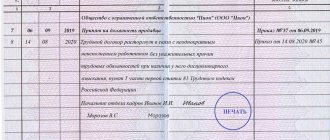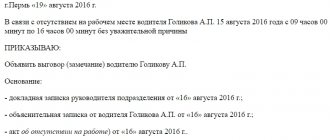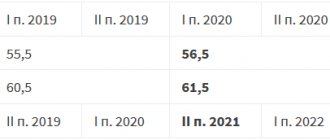What is a reprimand and how does it differ from a remark?
Article 192 of the Labor Code of the Russian Federation provides for various disciplinary sanctions. One of them is a reprimand, which is assigned for improper performance of official duties . The decision on the exacting measure is made by the manager , of which the employee is notified.
Attention! A working citizen cannot be punished more than twice for the same violation of discipline or failure to perform duties.
Article 192 of the Labor Code provides for another type of disciplinary sanction - reprimand . In legal terms, a reprimand and a reprimand do not differ from each other, since they have the same force and the same consequences, as well as the procedure for drawing up a punitive measure. However, we can conclude that the remark refers to a more lenient type of penalty .
Free legal consultation
+7 800 350-51-81
The remark serves as a kind of signal to which the offending employee must heed. A responsible and diligent working citizen must calmly listen to criticism of himself from management and take measures to ensure the proper performance of work duties.
NTVP Kedr – Consultant
Types of disciplinary sanctions - reprimand, reprimand and dismissal for special reasons. Other types of penalties for commercial sector organizations, as a rule, are not applied. Exceptions are possible in very rare cases for specific organizations, when the application of another type of penalty is directly provided for by federal law, charters and regulations on discipline (Parts 1, 2 of Article 192 of the Labor Code of the Russian Federation).
2) check whether the duty that the employee violated is documented. For example, if the obligation is enshrined in a local regulatory act, make sure that the employee is familiar with it by signature, taking into account Part 2 of Art. 22 Labor Code of the Russian Federation. Otherwise, you will not prove in court (in case of a dispute) that the employee knew about his duty and, despite this, violated it;
You may be interested in:: Bought a Truck How to Move Without Plato If the Old Owner's Device is Disconnected
In a number of cases, when, after conducting an inspection, the commander can identify circumstances that will exclude the possibility of applying disciplinary sanctions to military personnel. A serviceman cannot be held accountable for actions or inaction:
- An order to issue a reprimand cannot be signed in the absence of written explanations about the violation committed. Announcing a reprimand without receiving written explanations from the employee has no legal force, except in cases where the employee refused explanations (the employee’s refusal must be recorded in the form of an act, in the presence of witnesses). The employee is given at least two working days to provide explanations. This means that for an offense committed, for example, today, a reprimand cannot be issued on the same day. At least two days must pass before the necessary documents are prepared.
- In addition to explanations from the employee, in order to sign an order to issue a reprimand, written evidence must be collected of the employee’s violation of certain internal company documents (rules, job descriptions, orders), indicating the points of specific documents that the employee violated, printouts of various recording devices, and others.
- An important condition for issuing a reprimand is its duration. A reprimand order may be issued no later than one month from the date of discovery of the violation and no later than six months from the date of its commission. Managers often like to collect “compromising evidence” on their subordinates in order to, if the opportunity arises, subject them to dismissal for violations committed, for example, during the year. If the manager “did not give effect” to the facts about the commission of an offense (did not sign the order to issue a reprimand or reprimand), then he has no grounds to dismiss the employee for failure to fulfill official duties as he already has disciplinary sanctions.
- The Labor Code distinguishes three types of disciplinary sanctions: reprimand, reprimand, dismissal. When applying one or another type of disciplinary sanction, the severity of the violation must be taken into account. That is, for being five minutes late for work, a reprimand or dismissal is hardly justified if this does not entail any irreversible consequences for the company.
- If the company has a representative body of employees, then when issuing a reprimand, its opinion must be taken into account.
- A violation may result in only one disciplinary sanction. That is, you cannot be reprimanded and fired at the same time for the same violation.
- After issuing an order to issue a reprimand, the employee must be familiarized with it against signature and provided with a copy of this order. That is, the employee must understand what he violated and why exactly he was reprimanded. If an employee refuses to familiarize himself with the order, then the refusal must be recorded in an act in the presence of witnesses.
- The validity of the reprimand is limited to one year. If during this period the employer does not have any claims against the employee, the reprimand is automatically considered withdrawn. If the employee is given other reprimands, the employee risks being fired for repeated failure to perform job duties. The legislation gives the employer the right to withdraw reprimands early, before the end of the year.
Often, employers use a reprimand as a kind of educational measure towards an employee, and sometimes they use it as a way for the employee to leave the company. At the same time, employers often do not bother to prepare documentary grounds for issuing a reprimand . Since complaints about the performance of duties by an employee are not always objective, the employee has a legitimate indignation at the use of such methods and a desire to appeal .
You may be interested in:: They Don’t Give the Child to the Mother
Any disciplinary sanction is unpleasant for the employee both from an economic and psychological point of view. The first remark usually significantly reduces work enthusiasm and reduces production performance. But there are also advantages: subordinates who have been “at fault” show more responsibility in the production process, closely monitor the work schedule and improve their own skills.
The procedure for applying a reprimand is set out in Article 193 of the Code. The basis for a reprimand is always the commission of a disciplinary violation by the employee. Such a violation most often includes dishonest performance of one’s labor functions or failure to perform them at all. The violation must include:
- Documentary recording of what happened. Without this, disciplinary proceedings cannot begin. The manager should draw up an act (for example, an act of absence from work).
- Clarification of the circumstances. The worker is required to be given two days to write an explanatory note. If they didn’t even listen to you, you can safely file a complaint.
- Clarification of the violator’s work reputation. To do this, the general director must talk with the immediate superior (for example, the head of a department) of the offender and find out how often he deviates from discipline standards.
- Documentation analysis. All violations must be confirmed by acts, memos or other written evidence. This is the only way to understand the last time an employee allowed himself too much and whether the previous penalty had expired.
- Assessment of the severity of the offense and mitigating circumstances. If a person deviated from the rules in an exceptional case (for example, in a state of passion), whereas before that he had repeatedly benefited the company, he can count on leniency.
- Issuing an order to impose a penalty and familiarizing the culprit with it. The absence of such a document, as well as the employee’s signature under it, will void the penalty.
- A remark is a warning for a one-time violation of discipline. May be valid for up to 12 months (see Article 194 of the Labor Code of the Russian Federation).
- A reprimand is a penalty for systematically committing misconduct. Its validity period is also up to a year.
- Dismissal. In accordance with paragraph 5 of Article 81 of the Labor Code of the Russian Federation, it follows if the employee continues to violate discipline in the presence of penalties.
Is it possible to fire an employee for reprimands and in what cases?
The Labor Code has Article 81, which provides for termination of an employment contract at the initiative of the employer. The article describes in detail the list of grounds for mutual termination.
Among others, the article regulates such grounds for dismissal as:
- Repeated failure by an employee to fulfill his direct official duties, if there is a disciplinary sanction against the working citizen.
- A single, but gross violation of discipline or a gross violation of one’s official duties.
Thus, the head of the organization has the right to dismiss a worker on his own initiative if the person was subjected to disciplinary action and still continued to improperly perform his duties, or in the case where the employee grossly violated or failed to fulfill his official duties.
How many reprimands are needed to dismiss an employee under the article?
We are all experts in our field, but everyone should know the fundamental laws. When going to work, it is better to find out all the rules on shore. What incentives and penalties await a newcomer in a new place? What can periodic violations of labor discipline lead to? Let's try to answer some questions.
- repeated failure to fulfill job duties without good reason in the presence of a disciplinary sanction;
- one-time gross violation of labor duties;
- an immoral act that does not allow one to continue working in this position.
May 08, 2021 urisgkmo 68
Share this post
- Related Posts
- VBD benefits for individual entrepreneurs
- Categories of Land in the Moscow Region for St.
- Who Must Notify the Tax Office of a Change of Personal Passport
- Can Li Yip Receive Chernobyl Payments?
Legislative regulation according to the Labor Code of the Russian Federation
A citizen who has violated discipline and has previously been subjected to disciplinary action may be dismissed at the initiative of the employer. The legislator does not directly indicate dismissal for a reprimand under the Labor Code of the Russian Federation as a basis for dismissal from office. But based on the legal meaning of Article 81 of the Labor Code, it will become clear that a penalty can serve as a basis for dismissal from office .
Naturally, each case of violation and failure to fulfill official duties is individual. The application of any penalty provided for by law is determined by the employer at his own discretion.
Dismissal of employees in the presence of reprimands
In terms of severity, a reprimand is located between a reprimand and dismissal (Article 192 of the Labor Code of the Russian Federation). It is used when it is necessary to punish staff more severely than normal censure, but without dismissal. This allows you to give him a chance to correct himself and at the same time focus his attention on the seriousness of the violation. Even the repeated application of such a penalty does not entail mandatory dismissal, but this indicates the systematic nature of the offenses, and then it is possible under clause 5 of Part 1 of Art. 81 TK.
We recommend reading: Calculation of a pension for a participant in the Chernobyl Union in Russia based on earnings in 1986.
1. If there is one or several reprimands, then for subsequent offenses all beneficiaries are allowed to vacate the vacancy, and there are no restrictions, except for pregnant women. It is forbidden to kick them out in any situation, even if they violate discipline (Article 261). It is allowed to reprimand pregnant women and apply other sanctions against them, and if their behavior becomes intolerable, they can be removed from work, but dismissal is prohibited. This can only be done at the woman’s written request.
If the manager does not want to continue cooperation with an undisciplined employee, there is no point in issuing another reprimand . According to the law, two disciplinary sanctions cannot be imposed for one offense. If the boss has reprimanded him, he does not have the right to dismiss the employee until he commits a new violation.
Penalties must be applied consistently. However, it is important to know that dismissal for a reprimand under the Labor Code of the Russian Federation is also possible if a one-time violation was committed. An employee can be dismissed from his position in the following cases:
How many reprimands must there be to fire an employee?
Is it possible to fire someone for one reprimand?
At the legislative level, for which an employee can be dismissed is not directly defined Dismissal after a reprimand is considered strictly individually , taking into account many factors: the severity of the disciplinary sanction, the characteristics of the citizen, his performance and other important and significant circumstances.
Thus, the head of an organization can remove an employee from his position on his own initiative, if he has an outstanding penalty and a violation or improper performance of his official duties.
Dismissal for 2 reprimands
Practice shows that often an employer decides to dismiss a person for two reprimands. Again, the number of disciplinary measures is not a basis for dismissal and is not legislated anywhere.
Most managers decide to dismiss an employee after two reprimands, because they believe that the employee does not want to improve, since even the first disciplinary measure did not affect him.
Dismissal for 3 reprimands
The law does not provide for the number of disciplinary measures in the form of a reprimand sufficient to justify dismissal on the initiative of the head of the enterprise. The employer has the right to dismiss a citizen who has violated discipline or improperly performed official duties.
The number of offenses committed does not affect dismissal from office. Here, a lot depends on various factors; you can receive three disciplinary measures for a minor violation or receive one disciplinary offense for gross improper performance of duties. Each case is individual and is considered separately from other cases.
Stages of dismissing an employee after a reprimand
Before making a decision to dismiss an employee, the employer must comply with civil law so that the procedure is considered legal.
- If a violation of disciplinary duties is detected by a person, the employer is obliged to draw up an act on the discovery of the violation in writing and in the proper form . If necessary, the employer has the right to demand that the offending citizen undergo a medical examination.
- After drawing up a report on the detected violation, the employer is obliged to request an explanation from the employee in writing . The employee has two days to write the explanation.
- The employer, independently or with the involvement of a special commission, considers the valid reasons described in the citizen’s explanation and, based on all the circumstances, makes a decision.
- A written order regarding disciplinary action is drawn up , with which the employer is obliged to familiarize the employee.
- If there are compelling circumstances, the employer, after ordering a disciplinary action, may issue an order to dismiss the citizen. The employee must also be properly familiarized with the order.
- A corresponding entry is made in the work book of the dismissed citizen.
- The head of the organization is obliged to make the final payment , and also, if necessary, issue a certificate of income to the dismissed employee.
How many reprimands are needed to dismiss an employee under the article?
- repeated failure to fulfill job duties without good reason in the presence of a disciplinary sanction;
- one-time gross violation of labor duties;
- an immoral act that does not allow one to continue working in this position.
- absenteeism;
- an employee being under the influence of alcohol or other drugs at work
- loss of trust;
- disclosure of secrets that became known to the employee during the performance of his duties;
- theft, embezzlement;
- violation of safety rules that resulted in an accident.
08/15/2019 TERMINATIONS: → Is it possible to dismiss an employee due to the expiration of the transfer period?
Our main employee goes to work. We notified the replacement employee that he would be terminated due to the expiration of his employment contract. And then it turned out that three and a half years ago he was hired as an assistant specialist (for training and transfer of cases), and then transferred to the position of a specialist during the absence of the main employee. Now the director insists on dismissal.
06/08/2020 TERMINATIONS: → The probationary period ends tomorrow.
The employee's probation period ends tomorrow. Can we decide today to dismiss him due to an unsatisfactory test result and give notice, and terminate the employment contract three days after the notice? Or is it possible to shorten the warning period?
You may be interested in:: Husband Chernobyl survivor Daughter Birth Grandson What payments are due
Employees who cannot be fired for reprimanding
The law establishes a list of persons who cannot be dismissed even on grounds such as a reprimand. This category of citizens includes:
- pregnant women;
- women with children under three years of age;
- parents with a disabled child;
- employees who are the sole breadwinners and have children under three years of age.
In addition, it is impossible to impose penalties and, accordingly, dismiss persons who are on vacation or sick leave .
How to appeal dismissal for a reprimand
A dismissed employee can appeal the employer's dismissal if he considers that the grounds for dismissal were unlawful and unfair. There are three ways to challenge dismissal:
- contacting the labor inspectorate;
- appeal to bodies considering individual labor disputes;
- filing a claim with the district court.
The legislation establishes a time limit for challenging – one month from the moment of familiarization with the dismissal order or receipt of the work book with a record of dismissal.
Attention! To the statement of claim, the dismissed citizen must attach a copy of his passport, a copy of his work record book, and also provide evidence confirming the fact of illegal dismissal from office. The plaintiff can call witnesses who will be ready to testify in favor of the plaintiff at the court hearing. If the outcome of the court hearing is positive in favor of the plaintiff, the citizen is fully restored to his official rights and can continue to fill the position from which he was dismissed.
About payments and compensations
Upon dismissal based on a reprimand, the employer must make a final settlement with the dismissed employee. The calculation should include wages for the time actually worked by the person, as well as compensation for unused vacation . In case of dismissal from a position at the initiative of the employer, severance pay is not paid.
The calculation must be made on the last working day of the employee subject to dismissal. If the employee is absent from the workplace on the last day, the due payments must be made no later than the next day from the written request of the dismissed worker.
What to remember
- There are only three types of penalties: reprimand, reprimand and dismissal.
- Based on the penalty, you can withdraw the bonus or dismiss the employee. It is impossible to issue a fine on the basis of a penalty - fines for disciplinary offenses are generally prohibited; they can be imposed only if the organization has suffered material damage.
- Penalties can be imposed for violation of labor discipline: absenteeism, failure to comply with work duties, theft and other offenses that interfere with the work of the company.
- To impose a penalty, you need to prepare five documents in order: an act of violation, a request for an explanatory note, the explanatory note itself (written by the employee), an order for the penalty, and an act of familiarization with the order.
- The penalty is valid for a year after issuance, it can be removed early.
How is an entry marked in the labor record?
At the legislative level, there is a list of information that can be entered into the work book (data about the employee, about the enterprise, about acceptance, transfer, dismissal and awards).
Important! It is prohibited to make an entry in the employee’s work book about disciplinary sanctions committed by him. The exception is a penalty in the form of dismissal from office.
When filling out the work book, there must be a note indicating that the employee has been dismissed from his position with a reference to the article of the Labor Code that served as the basis for the dismissal. The corresponding entry must bear the signature of a human resources employee or manager and the seal of the organization.










